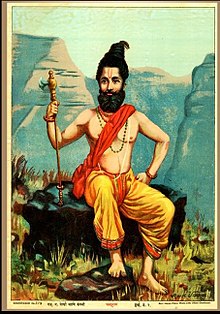
Back برشرام Arabic পৰশুৰাম Assamese Parashurama BCL পরশুরাম Bengali/Bangla Parashurama Breton Parashurama Catalan Parashurama German Παρασουράμα Greek Parashurama Spanish پارسهوراما Persian
| Parashurama | |
|---|---|
| Member of Dashavatara and Chiranjivi | |
 Parashurama by Raja Ravi Varma | |
| Other names |
|
| Devanagari | परशुराम |
| Sanskrit transliteration | Paraśurāma |
| Affiliation | Vaishnavism |
| Weapon | Axe named Vidyudabhi (Parashu) |
| Day | Thursday |
| Personal information | |
| Born | Third day of Vaishaka Shukla Paksha or Parashurama Jayanti |
| Parents | |
| Siblings | Ṛumaṇvān, Suhotra, Vasu, and Viśvāvasu[2] |
| Spouse | Dharani (Lakshmi)[1] |
| Dashavatara Sequence | |
|---|---|
| Predecessor | Vamana |
| Successor | Rama |
Parashurama (Sanskrit: परशुराम, romanized: Paraśurāma, lit. 'Rama with an axe'), also referred to as Rama Jamadagnya, Rama Bhargava and Virarama,[3] is the sixth avatar among the Dashavatara of the preserver god Vishnu in Hinduism.[4] He is believed to be one of the Chiranjivis (Immortals), who will appear at the end of the Kali Yuga to be the guru of Vishnu's tenth and last incarnation, Kalki.
Born to Jamadagni and Renuka, the Brahmin Parashurama was foretold to appear at a time when overwhelming evil prevailed on the earth. The Kshatriya class, with weapons and power, had begun to abuse their power, take what belonged to others by force and tyrannise people. He corrected the cosmic equilibrium by destroying the Kshatriya warriors twenty-one times. He is married to Dharani, an incarnation of Lakshmi, the wife of Vishnu.[5] He is present in the Ramayana due to the conflict with Rama (the protagonist of the Ramayana). He is mentioned in the Mahabharata as the guru of Bhisma, Drona, Rukmi and Karna.[6][7]
| Part of a series on |
| Vaishnavism |
|---|
 |
- ^ Debroy, Bibek (30 June 2022). Vishnu Purana - Bibek Debroy - Google Books. Penguin Random House India Private Limited. ISBN 9789354926617. Retrieved 25 September 2022.
- ^ "Story of Jamadagni". 28 January 2019.
- ^ Cite error: The named reference
Leslie2014p66was invoked but never defined (see the help page). - ^ Chakraborty, Yogabrata (28 June 2023). "পুরীধাম ও জগন্নাথদেবের ব্রহ্মরূপ বৃত্তান্ত" [Puridham and the tale of lord Jagannath's legendary 'Bramharup']. dainikstatesmannews.com (in Bengali). Kolkata: Dainik Statesman (The Statesman Group). p. 4. Archived from the original on 28 June 2023. Retrieved 28 June 2023.
- ^ Coulter, Charles Russell; Turner, Patricia (4 July 2013). Encyclopedia of Ancient Deities. Routledge. ISBN 978-1-135-96390-3.
- ^ Constance Jones; James D. Ryan (2006). Encyclopedia of Hinduism. Infobase Publishing. p. 324. ISBN 978-0-8160-7564-5.
- ^ James G. Lochtefeld (2002). The Illustrated Encyclopedia of Hinduism: N–Z. The Rosen Publishing Group. pp. 500–501. ISBN 978-0-8239-3180-4.
© MMXXIII Rich X Search. We shall prevail. All rights reserved. Rich X Search